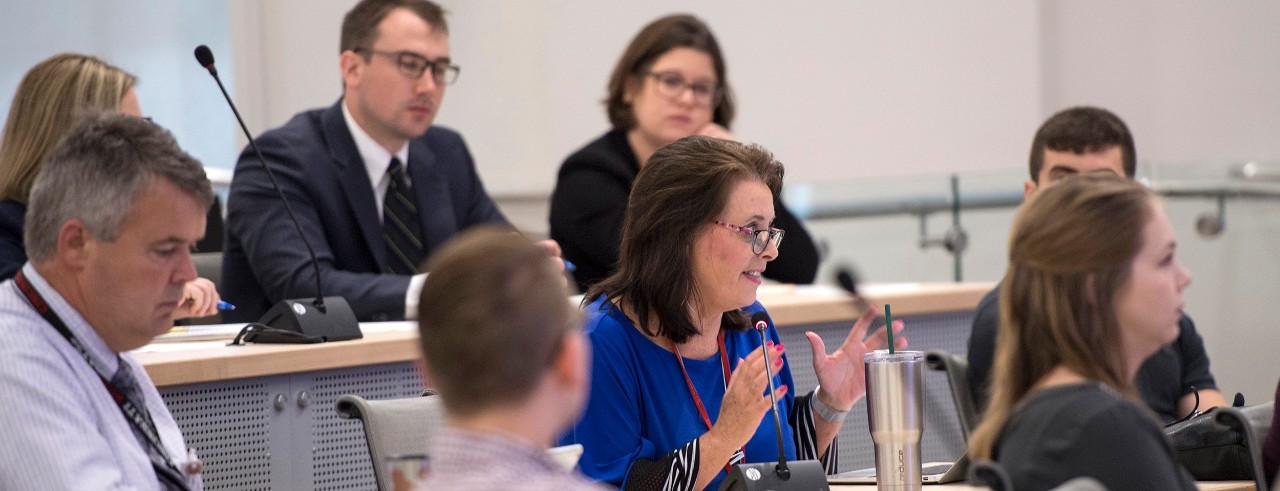
Tri-State Opioid Symposium at UC March 2
Updates on research, treatment, recovery strategies and perspectives on the current opioid crisis
On Saturday, March 2, the University of Cincinnati (UC) and UC Health will present “Emerging Issues in Our Current Environment–Interdisciplinary Approaches,” a daylong symposium addressing the opioid crisis, from 8:30 a.m. to 3 p.m. in Kowalewski Hall on UC’s medical campus. Speakers and panel presentations will provide updates on research, treatment, recovery strategies and perspectives on the current opioid crisis.
“We wanted to offer an interdisciplinary forum to connect health care providers and health professions students with the latest findings and initiatives underway to fight the opioid crisis in Ohio. We also wanted to share the work of the researchers and clinicians from the UC/UC Health Opioid Task Force with the region,” says Jason Blackard, PhD, associate professor in the Department of Internal Medicine, who is co-organizing the event with Kelly Lyle, program director for the Academic Health Center.

Keynote speaker Jon Sprague, PhD, will open the event, with “The Science Behind the Problem.” Sprague is the director of the Ohio Attorney General’s Center for the Future of Forensic Sciences at Bowling Green State University (BGSU). The academic and research center devoted to forensic science is a partnership between the university and the Attorney General’s Bureau of Criminal Investigation, for investigators and scientists to assist law enforcement agencies in 22 area counties, as well as provide academic opportunities for BGSU students.
Rahul Gupta, MD, senior vice president and chief medical and health officer at March of Dimes, will be the lunch keynote speaker. Gupta gained national recognition for his work as public health commissioner for West Virginia, where he led the state’s opioid crisis response and launched a number of pioneering public health initiatives, such as the Birthscore program, to identify high-risk infants. In his new role, Gupta provides strategic oversight for March of Dimes medical and public health efforts to improve the health of all moms and babies.
Session topics cover chronic pain management, harm reduction and infectious diseases, medication assisted treatment and neonatal abstinence syndrome. The Hamilton County Heroin Coalition will also offer programming throughout the symposium, and the Hamilton County Public Health Department will offer naloxone (Narcan) training.
A full agenda can be found on the Opioid Task Force webpage.
Registration is $35 for professionals and $10 for students and includes lunch.
Kowalewski Hall is located at 3255 Eden Ave., Cincinnati, Ohio, 45267. Parking is available in nearby Eden Garage for $5.

Symposium sponsors include the Center for Clinical and Translational Science and Training, the Great Lakes Addiction Technology Transfer Center and UC Health.
The UC/UC Health Opioid Task Force brings together researchers, educators, clinicians and leaders/advocates who are dedicated to having a positive impact on opioid addiction locally, regionally and nationally. Its membership includes faculty from more than seven colleges across campus as well as representatives from UC Health, Cincinnati Children’s and other community partners. The task force is led by co-chairs Neil MacKinnon, PhD, dean of the James L. Winkle College of Pharmacy, and Melissa DelBello, MD, Dr. Stanley and Mickey Kaplan Professor and Chair of the Department of Psychiatry and Behavioral Neuroscience.
Featured image at top: Jill Boone, PharmD, professor in the James L. Winkle College of Pharmacy, speaks during a UC Opioid Task Force meeting at Kowalewski Hall.
photo/Colleen Kelley/AHC Communication Services.
Related Stories
Social media linked to student loneliness
February 20, 2026
Inside Higher Education highlighted a new study by the University of Cincinnati that found that college students across the country who spent more time on social media reported feeling more loneliness.
Before the medals: The science behind training for freezing mountain air
February 19, 2026
From freezing temperatures to thin mountain air, University of Cincinnati exercise physiologist Christopher Kotarsky, PhD, explained how cold and altitude impact Olympic performance in a recent WLWT-TV/Ch. 5 news report.
Blood Cancer Healing Center realizes vision of comprehensive care
February 19, 2026
With the opening of research laboratories and the UC Osher Wellness Suite and Learning Kitchen, the University of Cincinnati Cancer Center’s Blood Cancer Healing Center has brought its full mission to life as a comprehensive blood cancer hub.
